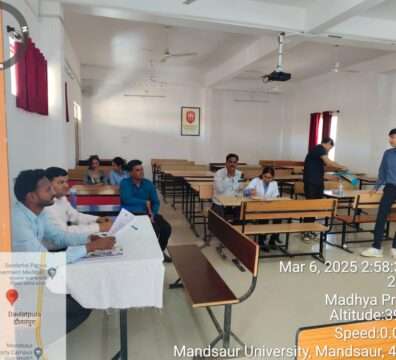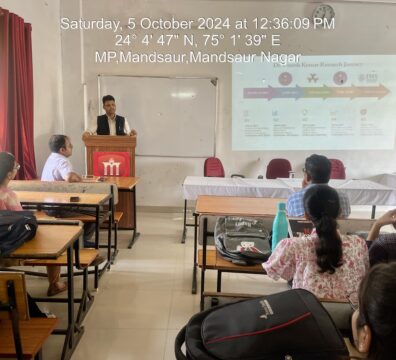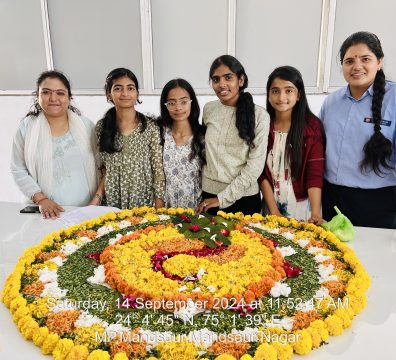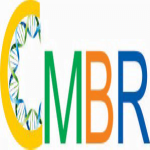ACTIVITY
DEAN'S MESSAGE
COURSES
SYLLABUS/ SCHEME
PROGRAM OUTCOME
ELIGIBLITY
LAB
FACULTIES
Departmental Activity
Parent Teacher Meeting
Department of Life Science organizes the parent teacher meeting on 6th March 2025. Total 18 parents were visited in the
One-day Seminar on “Gut Microbiomes
Faculty of Life Sciences had organized one day’s seminar on “Gut Microbiomes and Its Link to mental Health: The Gut
Eco-Friendly Rangoli Competition: A Message
Department: Health & Nutrition Club, Facultyof Life Sciences Year/Semester: UG, PG students & Facultymembers Activity: Health and Nutrition Club Activity
Basic health checkup
Department: Health & Nutrition Club, Faculty ofLife Sciences Year/Semester: UG, PG students &Faculty members Activity: Health and Nutrition Club activity
MOU's
About Life Sciences
The Faculty of Life Sciences was established in the year 2016. It offers B.Sc. (Hons.)Biotechnology & Microbiology and M. Sc. Biotechnology & Microbiology courses. The intakes for UG programs are 30 students; while in postgraduate programs are 18 seats. It offers top-class infrastructure, highly qualified and dedicated faculties, and an excellent environment for academic and intellectual growth. The Faculty of Life Sciences has international and national MoUs with various institutes and industries. The faculty has developed a modest academic infrastructure comprising of smart classrooms and Hi-tech laboratories with advanced instrumentation facilities. This department endeavours not only to produce excellent academic results but also to produce entrepreneur and skilled professionals.
Departmental Gallery
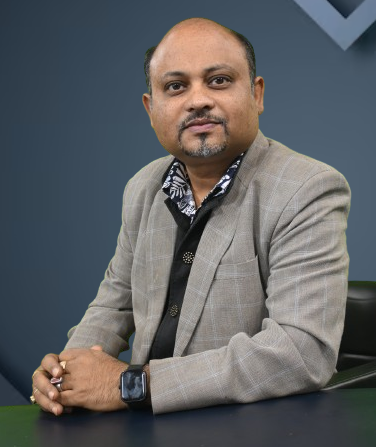
Dean's Message
Greetings!
Welcome to the Faculty of Life Sciences at Mandsaur University (FLS-MU) !!
The Faculty of Life Sciences is a force to reckon with in the campus. It has well qualified, experienced and dedicated faculty with exceptional research profiles and vision. Its areas of research interest and expertise cover a broad range from diverse areas in Life Sciences and allied fields. Academic pursuit at Mandsaur University will be an inspiring, challenging and enjoyable experience which the students will cherish forever. The FLS-MU offers some of fastest growing and higher demand programs of Life Sciences. University students are at the heart of MU’s excellence in research and education, studying with distinguished faculty and accessing high-tech research facilities, scholarly collections, and innovation. Here, we build bridges between our students and alumni. Our alumni live throughout the India and engage in a variety of careers, both academic and nonacademic, and the experiences they share support our graduate students as they conduct and complete their studies.
This Department is one of the best institute for the UG and PG courses in Biotechnology and Microbiology. Some of the key highlights of the department are-
- Job oriented syllabus designed by Industrial Experts, Eminent Scientist and academicians
- Research based learning through Audio-Visual classes in smart classroom
- Choice based credit system
- Skill and ability enhancement, open electives courses
- Job oriented internship/field project/apprenticeship
- Student centric academic flexibility
- State-of-the-art Hi-Tech laboratories with sophisticated instrumentation facilities
- National and international MoUs with industries, academic universities, and research institutions
- Special career guidance and counseling for higher studies
Many of the biggest advances in our world, along with compelling solutions to seemingly intractable problems have come, and must continue to come from hard work and dedication. As your dean, I am committed to doing everything; I can to foster the best conditions for your research and teaching, including protecting and nurturing academic freedom.
Whether advancing groundbreaking ideas or working alongside faculty and undergraduates, our teachers, mentors, and innovators are pushing the boundaries of what we know and how we learn. Their research, begun at MU, has the potential to shape the future of our India.
Best Wishes.
Prof. (Dr.) Arunava Das
Dean, Faculty of Life Sciences
Mandsaur University
COURSES
- B.Sc. (Hons.) Biotechnology
- B.Sc. (Hons.) Microbiology
- B.Sc. (Forensic Science)
- M.Sc. Biotechnology
- M.Sc. Microbiology
PEOs, POs, PSOs & COs
Why Study Life Sciences
Duration: UG 3 years & PG 2 years (Semester System)
AFFILIATION
Constituent College of Mandsaur University
ELIGIBILITY CRITERIA
Passed Higher Secondary school (10+2) Scheme or equivalent examination approved by the various universities and statutory in appropriate discipline. The admission to the M.Sc. Course shall be Passed Bachelors degree (B.Sc.)
MODE OF ADMISSION
For admissions please visit our portal to register/login yourself and proceed ahead with your admission application.
Syllabus/Scheme
- First Semester
- Second Semester
- Third Semester
- Fourth Semester
- Fifth Semester
- Sixth Semester
- Seventh Semester
- Eighth Semester
Laboratories
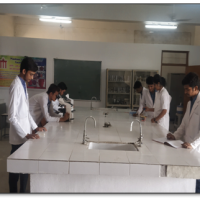
Biotechnology Lab
The Biotechnology Laboratory at Faculty of Life Sciences, Mandsaur University offers state-of-the-art facilities and hands-on activities to help students better understand the promising approach of biotechnology and learn its tools and techniques. The laboratory has latest equipment to conduct various biotechnological experiments starting with basic cell biology to modern DNA analysis.
The laboratory is equipped with Autoclave, Colorimeter, pH meter, Electronic weighing Balance
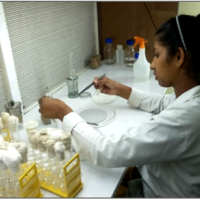
Microbiology Lab
The Microbiology Laboratory at Faculty of Life Sciences, Mandsaur University devoted to teach students the techniques for the culturing, examination, and identification of microorganisms including bacteria, fungi, yeasts, and algae. The laboratory is equipped with Autoclave, Incubator, Ultrasonic Cleaner, Digital Colony Counter, Laminar Air Flow, Water Bath, Magnetic Stirrer, BOD Incubator, Microscope and other equipment’s for culturing and preservation of microbes.
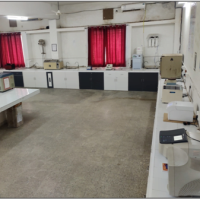
Bioinstrumentation Lab
The bioinstrumentation laboratory provides students with equipment and supplies for studying, designing, and applying instrumentation to obtain data as part of the scientific method which includes UV-Vis Spectrophotometer, PCR, Gel Documentation System, Cooling Centrifuge, Shaker Incubator, Shaker water Bath, Dry Bath incubator, Ice Flaker, Gel Electrophoresis unit, UV Trans-illuminator, Deep Freezer (-40°C), BOD Incubator, Camera attached Biological Trinocular Microscope, and HPLC.
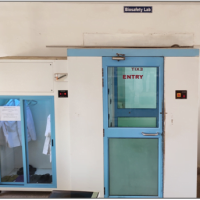
Bio-safety Lab
The Bio-safety Laboratory at Faculty of Life Sciences, Mandsaur University is designed to provide an environment for diagnostic work and research on easily transmitted pathogens which can cause fatal disease. All procedures involving the manipulation of infectious materials are conducted within biological safety cabinets, specially designed hoods, other physical containment devices, by personnel wearing such as appropriate personal protective clothing and equipment. The laboratory has special engineering and design features.
Research & Development
Faculties

Professor, Dean of life sciences & Dean of academic, Mandsaur University, Mandsaur
Prof. (Dr.) Arunava Das
Professor, Dean of life sciences
Associate Professor
Dr. Shekhar Jain
Dr. Shekhar Jain is working as Associate professor at Faculty of Life Sciences, Mandsaur University, Mandsaur, Madhya Pradesh, India. He held the role of M.P. State President for the year 2023-24 and served as the M.P. State Coordinator for the Microbiologist Society, India, from 2021 to 2023. He also served as the University Coordinator for the Internal Quality Assurance Cell (IQAC). He has over 13 years of experience working at prestigious institutions such as Mandsaur University, Indian Agriculture Research Institute (New Delhi), Amity University (Noida), and Mody University (Sikar), among others. He has qualified CSIR-NET, ICAR-NET, R-SET, GATE. His research focuses on plant-microbe interactions to promote sustainable agriculture, enhance food security, improve crop yield, and manage biotic and abiotic stress using beneficial microbes. He has been honored with several prestigious awards for his research contributions, including the International Young Scientist Award (2020-21) from the International Institute of Organized Research, India; the National Level Senior Scientist Award (2021-22) from the Microbiologist Society, India (MBSI); and the Biotechnology Research Excellence Award (2023) from The Biotech Research Society, India (BRSI) and the Society of Life Sciences (SLS), India. He has published numerous high-quality research articles in national and international journals, contributed to book chapters, guided many students for the PG and Ph.D. research, and recently had three patents granted by the Indian Patent Office. Additionally, he has submitted approximately 200 gene sequences to the NCBI Gene Bank. He has reviewed and edited numerous research articles and topics for reputable journals. He received the ‘2022-Outstanding Research Topic Recognition’ from Frontiers in Microbiology for his contributions to the field. He is actively engaged in scientific societies and is a member of several esteemed organizations, including the Microbiologist Society of India (MBSI), the Association of Microbiologists of India (AMI), the Indian Phytopathological Society (IPS), International Institute of Organized Research (I2OR), and the Asian PGPR Society.
Assistant Professor
Dr. Teena Yadav
I am Dr. Teena Yadav, from Rajasthan, serving as an Assistant Professor in the Faculty of Life Sciences since July 2019. I completed my doctorate degree from Mandsaur University and a Master’s degree from the Central University of Rajasthan. My research primarily focuses on environmental microbiology. During my tenure at Mandsaur University, I have strived to contribute to its prestige by achieving significant milestones. I was honored with an award at the M.P. Ph.D. Colloquium 2022 by AIGGP and was among the selected participants for the National Workshop organized by NCMR, Pune (2022). Additionally, I successfully completed the Summer Faculty Research Fellow Programme (2023) at IIT Delhi and the Professional Development Program (2025) at Banaras Hindu University, Varanasi.
Assistant Professor
Dr. Yogendra Kumar Verma
Mr.Yogendra Kumar Verma is an Assistant Professor and Acting Head in the Faculty of Life Sciences at Mandsaur University, Mandsaur, Madhya Pradesh, India. With a robust academic background, including a PhD (submitted) in Gut Microbiology, he specializes in microbial ecology, molecular biology, and genetic research. His research focuses on the intricate relationships between gut microbiota and human health, aiming to enhance understanding of microbial interactions in health and disease. Mr. Verma's experience spans prestigious institutions such as Bangor University, United Kingdom, and the All India Institute of Medical Sciences, New Delhi, where he has contributed to research in infection biology, molecular diagnostics, and microbiome studies. He is passionate about advancing microbiological science through both research and teaching, mentoring students while fostering academic excellence. Mr. Verma actively participates in national and international conferences and has published extensively in prominent scientific journals.
Assistant Professor
Mr. Abhishek Singh Rajawat
Mr. Abhishek Singh Rajawat is an Assistant Professor in the Faculty of Life Sciences at Mandsaur University. With a Master’s degree in Biotechnology from Vikram University, he has diverse experience in research, teaching, and industry roles. Prior to his current position, he worked as a Scientist-B in the Virology RT-PCR Lab at Government Medical Autonomous College, Ratlam, and as a Quality Assurance Trainee at Ipca Laboratories Ltd. Mr. Rajawat is actively engaged in research, with a patent application for a mosquito repellent formulation and several presentations at national and international conferences. His expertise lies in molecular biology, microbiology, bioinformatics, and drug research. Mr. Rajawat is also dedicated to academic administration, career counseling, and organizing workshops to promote health and fitness awareness among students.
Assistant Professor
Dr. Ruchi Gupta
Dr. Ruchi Gupta is an Assistant Professor in the Faculty of Life Sciences at Mandsaur University, with a Ph.D. in Biosciences (Microbiology) from Jamia Millia Islamia, in collaboration with VMMC & Safdarjung Hospital and AIIMS, New Delhi. With over a decade of experience in teaching and research, her expertise lies in microbial genetics, antimicrobial resistance, and molecular diagnostics. She has published impactful research on fluoroquinolone resistance in Salmonella enterica and received awards including the VMMC Young Scientist Award and Dr. Shriniwas Award. Dr. Gupta is skilled in molecular techniques, recombinant DNA technology, and bioinformatics, and adept at using instruments such as PCR, DHPLC, Gene Sequencer, and Gel Doc. She is actively involved in faculty development programs, national and international conferences, research publications, and departmental R&D activities. Her dedication to microbiology education and research fosters innovation and inspires students and fellow researchers.
Assistant Professor
Dr. Gaurav Saxena
Dr. Gaurav Saxena is an Assistant Professor in the Department of Life Sciences at Mandsaur University and in-charge of the Bioinstrumentation Laboratory. A dedicated environmental microbiologist, his research focuses on bioremediation and microbial applications in environmental management. He has received several national and international honors, including the Young Scientist Awards (2020, 2021), Young Environmentalist Award (2018), and Young Achiever Award (2019). Dr. Saxena serves as a reviewer, environmental consultant, and member of various university committees. He has guided over thirty master's and five Ph.D. theses, organized conferences and workshops, and delivered invited talks globally. He holds editorial positions with journals such as Frontiers in Microbiology, PLoS Water, and Frontiers in Environmental Science. He is also an executive council member of NESA and an active member of several scientific societies including AMI, ISCA, MicroSoc (UK), and ACS (USA). His work continues to advance microbial solutions for environmental sustainability.
Assistant Professor
Dr. Ziaul Hasan
Dr. Ziaul Hasan is a young biochemist and academician, currently an Assistant Professor in the Department of Life Sciences at Mandsaur University. He holds a PhD in Biosciences from Jamia Millia Islamia, New Delhi and an MSc and BSc (Hons) in Biochemistry from Aligarh Muslim University. He has also qualified the MP SET examination and other teaching eligibility tests. With over 25 publications and 500+ citations, Dr. Hasan has contributed research articles, reviews, and book chapters. He has edited a book, supervised 10+ MSc dissertations, and mentors undergraduate students. An inventor, he holds a 2023 patent for an 'Algae-Powered Street Lamp.' Dr. Hasan teaches Biochemistry, Molecular Biology, and related subjects and has secured ICMR research grants. A reviewer for leading international journals, his research spans Protein Biochemistry, Structural Biology, and Computational Biology. Recognized for his contributions, he received the Best Oral Presentation Award (Delhi University, 2024), REX Karamveer Chakra (UN-iCONGO, 2019), and the Swami Vivekananda Excellence Award for social reform and youth empowerment.Recruiters







